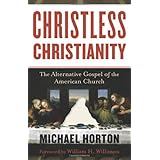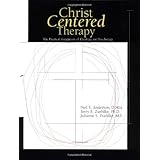
Average Reviews:

(More customer reviews)It is no small thing to take upon oneself the name Christian. Though it was first used as a form of derision when unbelievers mocked the "little Christs," the name was embraced by the earliest believers. The term, even when used mockingly, nicely encapsulated what they sought to do, namely, to imitate their Lord and Savior. Sadly, in the centuries since then, the word has become far too ambiguous and now refers to any number of faiths that, in one way or another, honor or respect Christ or that have some historical connection to his teachings. Amazingly, some of those called by the name of Christ actually deny him--perhaps not his existence but at least his uniqueness and his divinity. In Christless Christianity Michael Horton argues that such denial of Christ may not be too far from home. More and more evangelical churches, he says, are now essentially Christless. "Aside from the packaging, there is nothing that cannot be found in most churches today that could not be satisfied by any number of secular programs and self-help groups." Many churches have tossed out Christ and continue on without him, sometimes not even realizing that he has been lost along the way.
This is not to say that American evangelicalism has already reached a point of no return or that every church has rejected Christ. "I am not arguing in this book that we have arrived at Christless Christianity," says Horton, "but that we are well on our way. ... My concern is that we are getting dangerously close to the place in everyday American church life where the Bible is mined for `relevant' quotes but is largely irrelevant on its own terms; God is used as a personal resource rather than known, worshiped and trusted; Jesus Christ is a coach with a good game plan for our victory rather than a Savior who has already achieved it for us; salvation is more a matter of having our best life now than being saved from God's judgment by God himself; and the Holy Spirit is an electrical outlet we can plug into for the power we need to be all that we can be." Jesus has become supplemental instead of instrumental to the church. As the church has focused on "deeds, not creeds" she has become increasingly irrelevant and unfaithful. Church has become just another area in which Americans can live out the American dream. "In my view, we are living out our creed, but that creed is closer to the American Dream than it is to the Christian faith. The claim I am laying out in this book is that the most dominant form of Christianity today reflects `a zeal for God' that is nevertheless without knowledge--particularly, as Paul himself specifies, the knowledge of God's justification of the wicked by grace alone, through faith alone, in Christ alone, apart from works."
Amazingly, it is not theological liberalism that has drawn the church away from her creed, away from her biblical foundation. Instead, it is a kind of unbearable lightness--a faith that eschews biblical theology in favor of whatever happens to be the flavor of the day. Says Horton, "My argument in this book is not that evangelicalism is becoming theologically liberal but that it is becoming theologically vacuous. ... We come to church, it seems, less to be transformed by the Good News than to celebrate our own transformation and to receive fresh marching orders for transforming ourselves and our world. ... Just as you don't really need Jesus Christ in order to have T-shirts and coffee mugs, it is unclear to me why he is necessary for most of the things I hear a lot of pastors and Christians talking about in church these days."
Horton offers a description of this brand of "Christianity" that pervades so much of the evangelical scene these days. Following sociologist Christian Smith, he calls it moralistic, therapeutic deism. It offers this kind of working theology: God created the world; God wants people to be good, nice and fair to each other, as taught in the Bible and most world religions; The central goal of life is to be happy and to feel good about oneself; God does not need to be particularly involved in one's life except when needed to resolve a problem; Good people go to heaven when they die. Pause to consider much of the teaching you might find on your television on a Sunday morning and you'll see how apt a description this is. Horton traces this through Finney, through modern day Pelagianism and semi-Pelagianism and into the pulpits of Joel Osteen and other popular smooth talking preachers. He describes the kind of can-do spirit that allows such preachers to thrive. "When looking for ultimate answers, we turn within ourselves, trusting our own experience rather than looking outside ourselves to God's external Word." And here is where the Osteen's of the world are so skilled--they simply reflect and direct human wisdom back at humans all the while pretending as if they gleaned this wisdom from the Word of God. He shows that such preachers, while appearing to perhaps teach a kind of freedom from the law, actually do the opposite, burdening people with a new kind of legalism. "One could easily come away from this type of message concluding that we are not saved by Christ's objective work for us but by our subjective personal relationship with Jesus through a series of works that we perform to secure his favor and blessing. God has set up all of these laws, and now it's up to us to follow them so we can be blessed." This kind of Christianity makes God merely a means to an end rather than an end in and of himself.
In an insightful chapter discussing "how we turn good news into good advice," Horton shows how Christians are prone to turn indicatives into imperatives. In other words, we take a statement of fact and turn it into an exhortation. This, too, drives people to a form of legalism in which they are ultimately responsible for their own salvation and sanctification, even without understanding or embracing the gospel message. "Across the board in contemporary American Christianity, that basic message seems to be some form of law (do this) without gospel (this is what has been done)." He deals well here with the constant exhortations in the church today to "be the gospel," amazed at the hubris of such a statement. "[Unbelievers] may not like our message anyway, but at least they might be relieved that we have stopped holding ourselves up as the way, the truth, and the life. If the message the church proclaims makes sense without conversion, if it does not offend even lifelong believers from time to time so that they too need to die more to themselves and live more to Christ, then it is not the gospel." St. Francis' exhortation to "Preach the gospel at all times; if necessary use words" has never offended a soul.
Final chapters look to "your own personal Jesus" and the resurgence of Gnosticism and to "delivering Christ," examining the relationship between the message and the medium. Horton notes that men like Barna and so many others are advocating a wholesale abandonment of the institutional church. "Instead of churching the unchurched," he laments, "we are well on our way to even unchurching the churched." Here he speaks of the critical importance of the local church and says "the faithful ministry of Word, sacrament, and discipline is the mission" of the church. "A genuinely evangelical church will be an evangelistic church: a place where the gospel is delivered through Word and sacrament and a people who witness to it in the world." He calls for the church to narrow its commission from fixing all of the world's ills to simply returning to the basics. "The church as people--scattered as salt and light through the week--has many different callings, but the church as place (gathered publicly by God's summons each Lord's Day) has one calling: to deliver (and receive) Christ through preaching and sacrament." Of course Christians, the church as people, should pursue justice and peace, but this ought to be done through common grace institutions along side non-Christians rather than through the church as a place. The church needs to mind its own business and get its own house in order.
In the final chapter, Horton calls for resistance. "What is called for in these days, as in any other time, is a church that is a genuine covenantal community defined by the gospel rather than a service provider defined by laws of the market, political ideologies, ethnic distinctives, or other alternatives to the catholic community that the Father is creating by his Spirit in his Son. For this, we need nothing less than a new Christian where the only demographic that matters is in Christ."
Through all of this I'd suggest the most important statement in the book may just be this: "It is not heresy as much as silliness that is killing us softly." This is where the book may be most useful for the conservative Christians who are the audience most likely to read it. All of us can fall into silliness without tossing aside the gospel. We can hold fast to Christian theology, even while allowing silliness and levity to pervade the very fabric of our church. A once-serious institution can become overrun by programs and purposes that slowly erode the gravity and simplicity of the church's unique calling. This book is a call for the church to return to its biblical foundations and to remain true to those convictions. It is a clarion call and one that Christians would do well to heed. Christless Christianity is an excellent and timely book and one I would not hesitate to recommend to any Christian.
Click Here to see more reviews about:
Christless Christianity: The Alternative Gospel of the American Church Get 33% OFF
Get 33% OFF
Click here for more information about Christless Christianity: The Alternative Gospel of the American Church







